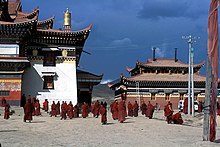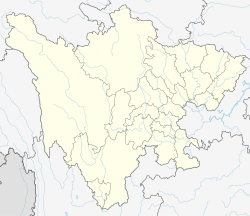Nangzhik Monastery (Wylie: snang zhig dgon, Chinese: 郎依寺, locally pronounced "Narshi" or "Nogi"), formerly known by several other names (Wylie: snang zhig rgyal bstan phun tshogs gling, snang zhig bkra shis g.yung drung gling, snang zhig phyogs las rnam rgyal bkra shis g.yung drung gling), is a monastery of the Bon religion in Amdo, modern Ngawa Town, Sichuan, China.[1] It is about a 4 kilometres (2.5 mi) walk up a shortcut to reach the monastery on a hill to the north of the town. On a hill to the east is another Bon monastery named Togden or Topgyel which has a large stupa nearby.[2]
| Nangzhik Gompa | |
|---|---|
 Nangzhik Gompa or Narshi Monastery | |
| Religion | |
| Affiliation | Bon |
| Leadership | Home to 800 to 1000 monks |
| Location | |
| Location | Ngawa Tibetan and Qiang Autonomous Prefecture, Sichuan, China |
| Geographic coordinates | 32°56′6.9″N 101°43′37.92″E / 32.935250°N 101.7272000°E |
| Architecture | |
| Founder | Nangzhik Lodro Gyatso |
| Completed | 1107 Renovated in 1754 |
History
editFounded in 1108 as Gyelten Püntsok Monastery (Wylie: rgyal bstan phun tshogs gling) by Nyimadzin (Wylie: Nyi ma ’dzin), it was moved to its present site in 1754.[3] It is a large monastery with about 800-1000 monks, and it is said to be the biggest Bon monastery in Tibet.[4] Nangzhik is a branch of Nogi (Duiansi) at Changla in Songpan County.[5]
Footnotes
edit- ^ Dorje (2009), p. 780.
- ^ Kotan Publishing (2000), p. 228.
- ^ Dondrup Lhagyal, Phuntso Tsering Sharyul, Tsering Thar, Charles Ramble and Marietta Kind Edited by Samten G. Karmay and Yasuhiko Nagano. rNga khog (180) sNang zhig Monastery, A Survey of Bonpo Monasteries. 2003, 2010.
- ^ Dorje (2009), p. 780.
- ^ Kotan Publishing (2000), p. 228.
- ^ Bya’phur Nam mkha’ rgyal mtshan (1969-1995). Phyogs las rnam par rgyal ba’i sde chen po bkra shis g.yung drung gling ngam Snang zhig rgyal bstan phun tshogs gling gi gdan rabs bsdus par bshad pa rdzogs ldan ngag gi rgyal rnga zhes bya ba bzhugs so [History of the Abbatial seats and lineage holders of the Nangzhi monastery in Rnga ba] Solan: Mu khri bcan po zhang bod rig gzhung zhib ’jug khang, 1994.
- ^ des Jardins, Jean-Marc (April 2012). "The records of Tshul khrims mchog rgyal on the Black Phur pa cycle of the Tibetan Bon pos" (PDF). Revue d'Études Tibétaines. 23: 175.
References
edit- Dorje, Gyurme (2009). Footprint Tibet Handbook. Footprint Books. ISBN 978-1-906098-32-2.
- Kotan Publishing (2000). Mapping the Tibetan World. Kotan Publishing, 2004 reprint. ISBN 0-9701716-0-9.
External links
edit- Picassa photos: [1][permanent dead link]
- Collection of Bon texts from Nangshik Monastery
